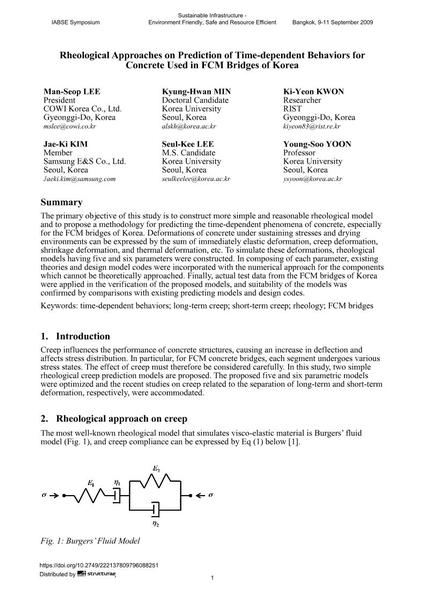Rheological Approaches on Prediction of Time-dependent Behaviors for Concrete Used in FCM Bridges of Korea

|
|
|||||||||||
Bibliographic Details
| Author(s): |
Man-Seop Lee
Kyung-Hwan Min Ki-Yeon Kwon Jae-Ki Kim Seul-Kee Lee Young-Soo Yoon |
||||
|---|---|---|---|---|---|
| Medium: | conference paper | ||||
| Language(s): | English | ||||
| Conference: | IABSE Symposium: Sustainable Infrastructure - Environment Friendly, Safe and Resource Efficient, Bangkok, Thailand, 9-11 September 2009 | ||||
| Published in: | IABSE Symposium Bangkok 2009 | ||||
|
|||||
| Page(s): | 16-23 | ||||
| Total no. of pages: | 8 | ||||
| Year: | 2009 | ||||
| DOI: | 10.2749/222137809796088251 | ||||
| Abstract: |
The primary objective of this study is to construct more simple and reasonable rheological model and to propose a methodology for predicting the time-dependent phenomena of concrete, especially for the FCM bridges of Korea. Deformations of concrete under sustaining stresses and drying environments can be expressed by the sum of immediately elastic deformation, creep deformation, shrinkage deformation, and thermal deformation, etc. To simulate these deformations, rheological models having five and six parameters were constructed. In composing of each parameter, existing theories and design model codes were incorporated with the numerical approach for the components which cannot be theoretically approached. Finally, actual test data from the FCM bridges of Korea were applied in the verification of the proposed models, and suitability of the models was confirmed by comparisons with existing predicting models and design codes. |
||||
| Keywords: |
rheology time-dependent behaviors long-term creep short-term creep FCM bridges
|
||||
